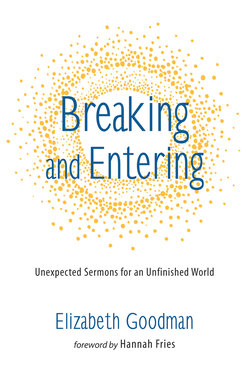Читать книгу Breaking and Entering - Liz R. Goodman - Страница 5
На сайте Литреса книга снята с продажи.
Foreword
ОглавлениеAt the crack of dawn the women go to the tomb, bringing spices to anoint the body. They are surprised, when they arrive, to find the stone rolled away: instead of death, an empty space. The sun comes up over the horizon, breaks through the opening, illuminates that space, filling the emptiness.
God breaks in.
Present tense: God breaks in, then and now. Is breaking: present progressive, ongoing. In the midst of terror and grief, in the midst of the banal everyday, God breaks in. It is sudden and slow, powerful and peaceful, awesome and simple.
Clearly, we aren’t talking about petty crime here, though you’d be excused for thinking of “breaking and entering” as an act of violence and a disregard for law or boundaries. When it comes to God, however, Reverend Liz Goodman will likely dissuade you of the former . . . but perhaps not the latter. “This is a god who upsets social convention, preferring instead the freedom of eternal life,” Goodman writes. “This is a god who breaks down human culture, preferring instead the Kingdom of Heaven.” Think of Jesus, breaking religious law and healing on the Sabbath, breaking bread with all manner of unsavory people, making the authorities uncomfortable.
Break is a word that surfaces a lot in these sermons. In it is the possibility for a grand, divine shakeup that startles us out of complacency and moves us always toward renewal and redemption. Jesus’s message of peace is a “radical break” from what’s come before; God’s grace does not come at some final end time, but is “breaking even now, breaking in even here.”
And that is a good thing—a very good thing, according to Goodman. Because it means another world is within our grasp, within the sight of our imagination. We can reach beyond intolerance, violence, injustice, and greed; we can see the Kingdom of God among us.
Yet this kingdom is not defined by power as we know it. It is quite a different kind of power, rising from within and spilling out in the form of “self-emptying love.” The reign of God comes “not as an imposition from on high, but as the leaven slowly causing the dough to rise” or as a weed “breaking out” in our midst, “undermining, choking out the good fruits of civilized culture”—that is, the “civilized” culture that still runs on the sweat of exploited workers, that still harbors racism, that still makes outcasts of the poor and sick.
Goodman sees a flawed and wounded world, yes, but one that is still being formed. In this ongoing act of creation, each of us is called to participate, to be co-creators. While visioning and re-visioning this world-in-progress, Goodman returns again and again to the cross as the model of radical self-giving love by which we may know the god we are to follow. Her sermons thirst, palpably, for justice and brim with compassion for the world we have been given; her vision is one of wholeness.
You will not find in these sermons easy answers, quick judgments, or comfortable platitudes. Such things would be impossible with the intellect and curiosity at work (and play) here—Goodman is too comfortable with discomfort. Underneath the expected interpretation is often another perspective, a surprising twist. Behind language and words themselves lurk layers of meaning and opportunities for reinvention.
What you will find in this book is a conviction that God’s love is both unsettling and transformative—and larger and more inclusive than we can comprehend. It is here among us, always already breaking among us, and it is reason for joy.
Hannah Fries
Author, Little Terrarium, a collection of poems
Member, Monterey United Church of Christ
Monterey, Massachusetts
